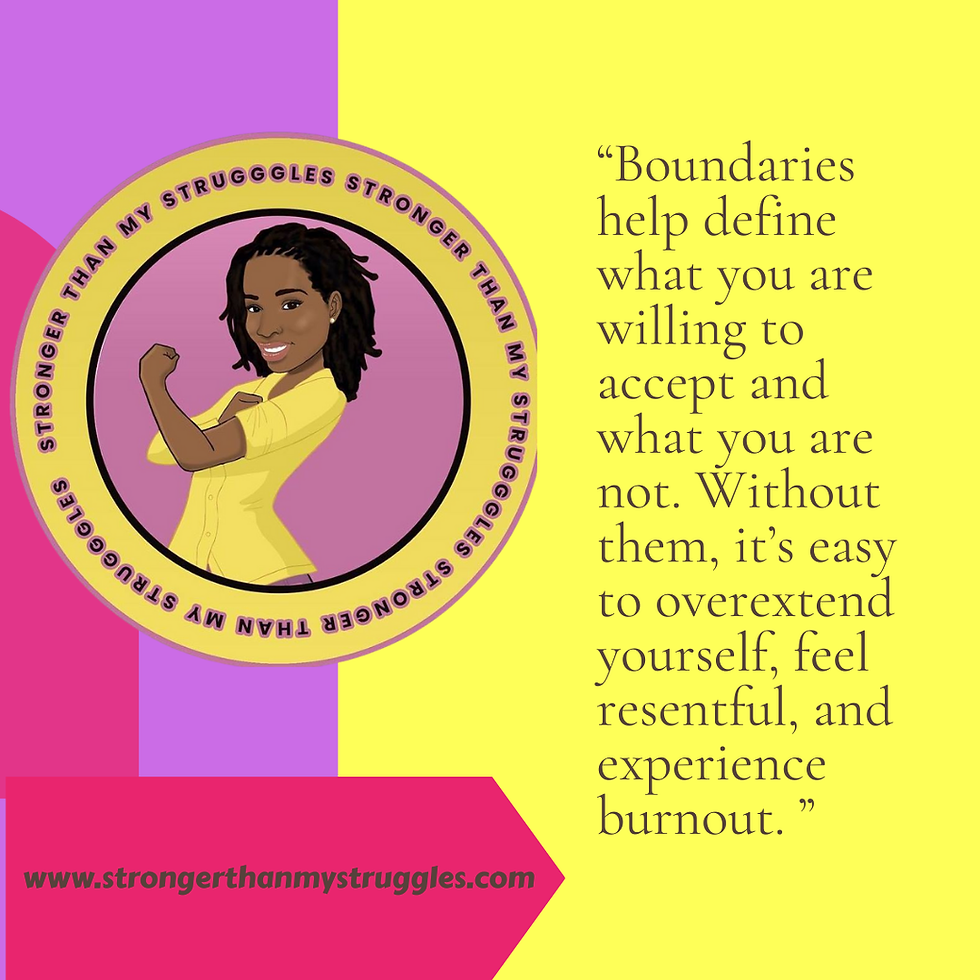Setting Boundaries: A Guide to Protecting Your Time and Energy
- Sep 21, 2025
- 3 min read

With the season changing life will get busier for many of us, it’s easy to feel stretched thin, overcommitted, and on the verge of burnout. Between work, family responsibilities, social obligations, and personal goals, your time can quickly feel like it’s slipping away. One of the most powerful tools you have to maintain balance, protect your energy, and nurture your well-being is setting healthy boundaries. Boundaries are not selfish—they are essential for your mental, emotional, and physical health. But as schedules fill up, setting them can feel intimidating, especially when guilt creeps in.
Why Boundaries Matter
Boundaries help define what you are willing to accept and what you are not. They give clarity to your relationships and prevent others from taking advantage of your time and energy. Without them, it’s easy to overextend yourself, feel resentful, and experience burnout. Healthy boundaries allow you to show up fully in the areas that matter most while protecting the areas that sustain you—your rest, your creativity, your personal growth, and your peace of mind.
Practical Ways to Set and Maintain Healthy Boundaries
Know Your Priorities Begin by identifying your top priorities. What truly matters to you—your health, family, career, or personal development? Understanding your priorities makes it easier to say no to commitments that do not align with them.
Learn to Say No Clearly and Kindly Saying no doesn’t need to be harsh or apologetic. A simple, “I appreciate the invite, but I won’t be able to participate this time,” communicates your limits without guilt. Practice saying no in a calm, assertive tone.
Schedule Time for Yourself Protect blocks of time in your calendar for rest, self-care, and personal projects. Treat these appointments with the same importance as a work meeting or family obligation.
Communicate Boundaries in Advance Whether it’s with coworkers, family, or friends, communicating your limits clearly and early prevents misunderstandings. For example, if you are unavailable for calls after 8 PM, let people know your preferred times for communication.
Use Technology to Your Advantage Set reminders, alarms, or calendar notifications to protect your time. Turning off notifications during personal time or using “Do Not Disturb” modes can reinforce boundaries without constant mental effort.
Check In With Yourself Regularly Boundaries are not static—they may need to shift as your life changes. Regularly evaluate whether your current boundaries still serve your well-being and adjust as needed.

Overcoming Guilt Around Setting Boundaries
It’s natural to feel guilty when saying no or prioritizing yourself, especially if you’re used to pleasing others. To overcome this guilt:
Remind Yourself of the Purpose: Boundaries protect your ability to show up fully for yourself and others. They are not a punishment—they are a necessity.
Practice Self-Compassion: Speak to yourself with kindness. Setting limits doesn’t make you selfish; it makes you responsible for your health and energy.
Reframe Your Thinking: Saying yes to everything may temporarily please others, but over time it can lead to resentment, stress, and exhaustion. Saying no is actually a gift to both you and those around you.
Start Small: Begin with minor boundaries, such as limiting extra tasks or politely declining invitations. Gradually, you’ll gain confidence to set larger boundaries.
Setting boundaries isn't always easy, especially when we are afraid of losing people we care about. Not everyone takes to boundaries the same way. Some take offense, but that's okay; those who don't respect your boundaries don't belong in your life. Remember, life will continue to demand more of you, but your energy and well-being are finite resources. Setting boundaries is a courageous act of self-respect that allows you to live with intention, focus, and balance. Remember, boundaries are not barriers—they are bridges to healthier relationships, more productive work, and a life that honors your needs.
By knowing your priorities, communicating clearly, and practicing self-compassion, you can confidently navigate a busy schedule while protecting your time, energy, and peace of mind.












































Comments